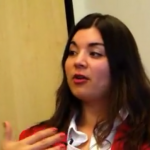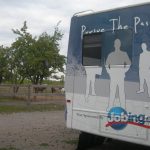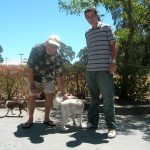Wayne McVicker knew what he wanted to be an architect early in his life, even in the face of severe colorblindness. Yet when he finally realized his dream, at least partially as a runner for an architecture firm, he found himself disillusioned by the lack of technological openness in the workplace. As he embraced technology in the architecture world, he realized that it was not in fact commercial or residential architecture that captivated him, but rather the architecture of technology and its limitless capacity to change and connect the world.
Wayne took his love for technology to the corporate world, working ten years before stumbling upon a goldmine opportunity in the healthcare industry. Neoforma, Wayne’s startup company, would become the sixteenth most successful IPO on record. It was the first healthcare-dotcom-B2B-ecommerce company, founded in 1996, before the birth of the dotcom boom.
After one of the most successful IPO’s on record, Wayne learned that money quickly earned is just as easily lost. One quote in his book “Starting Something” reads, “I made a few hundred million…I lost a few hundred million.”
But that did not deter him from his goals. In the end, he found a way to learn from his mistakes, rather then dwell on his failures. In 2001, Wayne founded Attainia, a company dedicated to ease the burden of capital medical equipment management on hospitals and other healthcare related industries. The business helps to ensure the equipment need of many service providers, as to allow better care to more efficiently reach the consumer, or patient.
Many people, having lost “a few hundred million dollars,” would probably be inclined to hold that against the world; Wayne used it as an opportunity to start over, helping many more people along the way, and constantly learning from past mistakes.
Interview: How To Start a Tech Company in Silicon Valley
Wayne McVicker co-founded a company that had the 16th largest IPO in history. Then the company went into a tailspin and for the most part, was discontinued. The interview with Wayne took place in a very nice office in Mountain View, where he started his new company, Attainia, with the same idea and model as his original company, just with all the new lessons he learned applying towards the new model. Twelve companies worked in an open environment, and a couple blue beanbags provided a comfortable place to crash.
Brett: We were a couple minutes late to the interview with Wayne McVicker. Our RV broke down in Berkeley and we spent the morning trying to get jumpstarted.
Wayne: I’d imagine it’s hard to get all the logistics right with everyone on their different schedules. I’d imagine your schedule is tough to manage. I’m a little jealous. I wish the technology was around in my younger days to do that sort of thing.
The reason why we started this company is similar to the reasons why we started the previous company. We started next door and loved the whole Mountain View scene, even though it was kind of funky back then. Now it’s definitely gone, not upscale because that’s an overstatement, but it’s just very busy. Very active. Very energizing.
In a startup company, that energy, whether you’re just going out for lunch or a break or a walk, is contagious. That’s what we love about the area.
I’m fascinated with this whole area. We were just in Hollywood a couple days ago and it’s kind of got that same feel of people just chasing their dream and make it materialize. It’s the same thing with business here. It’s all about that in my opinion.
But anyways, to start off these interviews, we edit these videos down to thirty seconds, two minutes, whatever you say, it’ll come out sounding good.
So you’ll pick out the worst stuff. I know how it goes.
Anyways, we’re traveling around the country in this RV to pick people’s minds to see how they developed their passion. In your case, it’s entrepreneurship. Business. Taking a company from an idea to a business. Am I on track with that?
Oh yeah. Absolutely.
So what we do is we find out how that passion developed and where I like to start, at 22, where did you think you were going to go in your career.
I was unique among my friends in that I knew what I wanted to do very early on. In high school I found out. I had multiple choices of things I was really interested in. Most of which I couldn’t do because I am severely color blind. That narrowed my options down to one choice, which is still a poor choice for a color blind person, but I loved architecture.
I was absolutely certain that I wanted to be an architect. I knew my path from sophomore year in high school. I pursued that. I went to school. I enjoyed it. Went to work at an architecture firm for a period of time and explored that for awhile. Did some stuff on my own. Really loved the field, and everything about it. I also came to be a little disillusioned about it because of the technology.
The use of technology was so poor at the time. This was just when…I was actually a runner for an architecture firm just when computers were starting to come into these firms. I was this young guy that didn’t have much to do other than explore the stuff no one else wanted to do. That happened to be computers.
These were in the days of $150,000 CAD stations. And dedicated computer operators for doing computer drafting and such. The technology distracted me from the architectural end. But I pursued both simultaneously for a period of time.
So I knew exactly what I wanted to do, and ironically, I’m doing exactly what I want to do now. And it’s the same thing, but in an entirely different industry.
So you started tinkering around with these CAD machines and computers and started seeing an interest in that?
Oh yeah. I was fascinated. It would take five minutes to insert a door between two lines in a plan to make a door opening. But it did it automatically. That was just astounding in it’s potential. Obviously it had to go from there to here. But it was more captivating than working on the drawing boards and doing the traditional architectural path that everybody else was doing at the time.
I was very interested in doing that. I was very good at it and drawn to it. It took me on a parallel, but outside course through my chosen path.
So eventually you became the architect of Neoforma. You did that whole plan and executed it and you had the IPO and all that. I just want to hear the story of how that idea developed and if you could elaborate on the few years before the IPO.
It started in the early nineties when I was working at a medical company, which I got into through the architectural path and the technology path. Again, in retrospect, it’s all perfectly obvious what happened. I would have never predicted I would be here today.
But I got recruited into a medical equipment firm that had these big radiotherapy machines. They required ten thousand square foot departments to support them. It was an architectural job of helping people, and architects specifically, plan for these big machines. But it also involved bringing technology into the company to do the drawings and bring the information associated with the equipment into a format, this is pre-web days, into a format that made it available to customers. So delivering that information out to a broader audience was something I was trying to do, but from an architectural perspective. And towards an architectural customer set.
Then, in that process, we found out there were a lot of barriers to getting that information from the supplier to the community. So we, meaning my partner who I met there who was a nuclear physicist, we started brainstorming on tools we could build to make this a better process in terms of software tools.
We started showing it customers, and the customers loved them. We said hey, this is something that is a lot more fun than our regular job. We’re doing this on the side, supporting our company, but we were really more interested in supporting the customer base. Through a long, cumbersome process, we spun our idea out as Neoforma.
This was in 1996. Again, pre-web. There was Yahoo, I think that was the year they went public. But there was a little bit of web stuff from the consumer side going on, but in our world of healthcare, which was our specialty, people didn’t know what the browser was. They didn’t know what a back button was.
We didn’t start on the web. We started out with CD’s, initially. We used the web simply as an input device for suppliers to give us information. Then we published it the other direction, and that’s when slowly but surely in the 1998 timeframe, started getting attention from investors.
Suddenly some articles were written in Forbes and the like. Consumer space is nice, but the real big space is business to business. As soon as they said that, ‘Business to Business,’ and the fact that it was bigger than ‘consumer,’ investors all got anxious to get on board. Before that they thought we were a little niche player and not doing much. Now slowly, but fairly quickly we were in the limelight.
We took on investment in a whole process that I’ve written about. A lot of interesting things happened to us, but we got on that fast track. Suddenly, we were one of the dotcom darlings in the area. Again, starting in 1998, when we took our first investment, it grew very quickly from a firm of 8 people to, by 1999, we had a couple hundred people. We were well on the path to IPO in 2000.
We brought in outside leadership to bring the company into the public domain. We took the company public. We were the first IPO of 2000. That was kind of fun. It was a time, and thinking back it’s hard to imagine, but it was a time when people thought of 1999 as a time when the IPO boom was over. Nothing was going to happen.
Of course, for the first three months of 2000, it was bigger than ever. Before things started heading the other way. We had a very successful IPO, huge gains. Monumental in retrospect because we were more of a concept than a company at that point. But built on a very solid foundation of a great organization and a great staff. A great group of people.
So you were the President at that time?
Yes.
So what kind of sacrifices did you have to make to start that in 1996 and see it to where it got to 2000 and you were about to do the IPO?
Well, for us, starting out, we just believed in it in a very simple business model of selling software. We had a model that had an easy chance at being a small software business success model. As we started setting our sights bigger, slowly but surely we started putting more of our own internal money into the business. That got to be a very big deal.
We put everything into it. Everything we had into the business. Before the time we suddenly became the darling in ’98. Between ’96 and ’98, we went from making some good money to saying that there is something bigger here that we’re doing that no one else saw that vision. Very few people saw that vision. We had to bridge that time with our own money.
So what made you see that vision? When everyone else was saying, ‘I don’t know what you guys are doing,’ but you had that vision. Can you describe that feeling?
It’s just so obvious to us. Which also made it difficult for us to sell the idea to others. Because it was just so obvious that this process was broken. It made no rational sense whatsoever to get from here to there. And the way communication was done, it was archaic. The technologies that were out there were enabling great things to happen. And it wasn’t happening.
For us, it was simply a matter of…it had to be done. It’s not more magical than that. We were not more brilliant than that to see something. It’s just that we had enough vision.
And this came through our corporate experience. We had been through this. It wasn’t some abstract idea. We had actually lived it with our customers for quite a few years. I was there for nine years at Varian. That experience was what gave me the certainty to know that this was the right thing to do.
From there it took quite awhile before the technology caught up with the vision. Before the market caught up with the vision. Ironically, it’s what we’re doing now. Finally, we’re fulfilling some things that we saw back in 1990 that we really wanted to do.
So were you scared at all? When you were pouring your own money and everything you had? I mean, that’s putting it all out on the line. What makes an entrepreneur do that, and what made you do that?
It’s funny I read Ben’s blog. He wrote one entry fairly recently about how most entrepreneurs don’t take that level of risk and aren’t risk takers at that level. I don’t find that with my experience. They tend to embrace risk partly for the thrill of it. There is a thrill of doing something that hasn’t been done before. And something that transcends normal patterns of rational behavior in many ways.
For us, it was terrifying financially. Only because we had families. Both of the founders, Jeff and I had families and children that we were responsible for. So from that perspective, it was terrifying at times. That created a great deal of stress. For us, that not everyone has to go through, especially those lucky enough to time things right. They don’t have to do that bridge process themselves and put everything on the line.
But for us, on the other hand, it also got us through the hard times because we had everything on the line. We didn’t have a choice. There was no backing out. Once we realized that this was healthcare and it was monster that was not ready for us, and there was some monster companies out there that wanted to make sure we didn’t succeed. That level of anxiety created the momentum to get us through the hard times, ironically.
It also meant some hard times for me. I had some bouts with depression during the time. From the outside world, everything was wonderful. From the inside, it was very very painful to see a lot of the things I was seeing with what was going on. In the overall marketplace and the overall stresses of building a company faster than a company really, generally should be built.
That’s interesting because if you don’t have anything on the inside, what’s the use in going about your idea? That kind of fits into what we’re doing, with how important is passion in business. And playing into the happiness of your career and everything.
I think people can be very happy without having that extra boost of passion in what they’re doing. They can just enjoy it enough to get through their day, put in their hours, and still have a good time without watching the clock. But, it’s not that thrill that you get when you truly passionate about doing something new.
When I’m hiring people, I look for that passion. I look for somebody who’s willing to put that extra amount of themselves into it. Of course, the goal is to balance that passion with, now this is the older side of me, with other values. Other family focus and values. Taking a vacation and taking time off and being able to be sick and just collapse that day.
We try to balance that now, far more than we did the first time around. But, that’s it. We definitely hire people who are passionate.
And passion, ironically, has a very close tie with people who are very resilient to change. People that can adapt to the business model today and tomorrow. The market is this, and then it’s that. When we write up, and when we write down. All those cycles in a startup environment are the same as what happens in a more family organization or a store that starts slowly and grows more organically and naturally. The same things happen, but they happen with greater peaks and valleys in a startup environment. The passion is what gets you through that and lets you adapt to an unpredictable environment.
With that said, does passion have its limitations in entrepreneurship?
It certainly can be, primarily if you have to many people who aren’t questioning each other. For me and my partner Jeff, we were nearly opposites in every way. I’m very introverted, he’s very extroverted. He’s very science and artsy type of guy. Yet, we share a common passion for where we want to go, but we are very different in how we approach it. Yet, we share a common respect with each other enough to get through tough arguments about whether it is the right way to go.
In the absence of that questioning within the process, passion can get wildly out of control. Similarly, if you have individuals that don’t share that common respect or just can’t overcome their differences, then the majority of startups I’ve seen fall apart that are based on sound ideas, fall apart because of personalities. People that just can’t get along and work together and come up with that middle ground that is usually required to get a company through that stressful startup time.
That’s interesting because we’re learning a lot about teamwork and stuff. We’re dealing with four different identities and we’re all friends, so it’s hard to get our work done but still maintain those friendships. It’s a pretty interesting dynamic.
Yep.
So eventually, in that year 2000, you get the IPO, you have one of the largest gains in history, did that alleviate any of that depression that you had previously?
No. Not at all. For very complex reasons which I tried to spell out over a long process of writing it all down and analyzing it. But ultimately what happened was we had a passion to do what we’re doing here, but the company went a different way because of a market condition that was pretty much out of our control. In retrospect, there’s not much we could have done differently to get us from there to here without this sort of bump in the middle.
The market was just not there. Sort of like the next computer when it came out. Great idea, great product, wrong time. A lot of products are that way. To do what we want to do now, we were at the wrong time. Another thing had to be done first. Very exciting for a lot of people, not very exciting for us. That sort of deep sadness that ultimately what we wanted to do, in spite of all the external success we had, we couldn’t do. That was disturbingly depressing. I’m just excited to be able to do it right this time.
So you’re passionate about what you’re doing now.
Oh yeah.
What do you enjoy the most?
I love seeing ideas that we’ve had for a decade finally come to fruition in a very rational environment. You talk about passion all the time. We’re extremely passionate here. We hire very passionate people. We’re lucky that we’ve been able to bring a lot of the passionate people from our previous venture into here, as well as bringing new individuals into the mix. So that passion is there, but it’s a much more rationalized passion around a more realistic expectation on what we’re doing. We have a more realistic time frame, although we’re always trying to stretch. We’re also accept that things take a little longer.
Some of the peaks and valleys have been cropped a bit, but with that comes an increased ability to actually fulfill on the ultimate vision we have of making a real difference in healthcare here. Our little neck of the woods, it’s a small niche in healthcare, but it’s going to make a big difference in the quality of healthcare around the world. Knowing that we’ve found that right balance of keeping the passion, and keeping our values, and our vision, but also keeping our sanity along the way.
If you could back to when you were 22 years old and tell yourself one piece of advice, what would you tell yourself?
That’s a good question. I would say follow your passion. Ironically. There were times where I felt like I needed to do certain things because maybe some idealistic models of what architects were at that time. Here’s the path you go through to artistic fruition of what I thought I needed to do, rather than being comfortable with what I was doing and what my real interests were. Versus my vision of what my interests were.
I would rather have been more comfortable pursuing that. I would have done some things earlier on the technology side, driving more aggressively. Outside of what I thought my path was.
So again, I had this path. I’m actually an architect of software instead of an architect of buildings, but it’s the same exact thing. Who I am, and what my skills are, are the same. But because I had a solid vision of what I thought I should be doing, I think I restricted myself in those early days a bit too much.
Interesting. Last question, and this is just for the purposes of the documentary that we’re trying to compile from all this footage, but what is your definition of passion?
Passion evokes an emotional level of response. So I would say passion is the combination of certainty with emotional commitment. Certainty driven from ideally, experience. With






